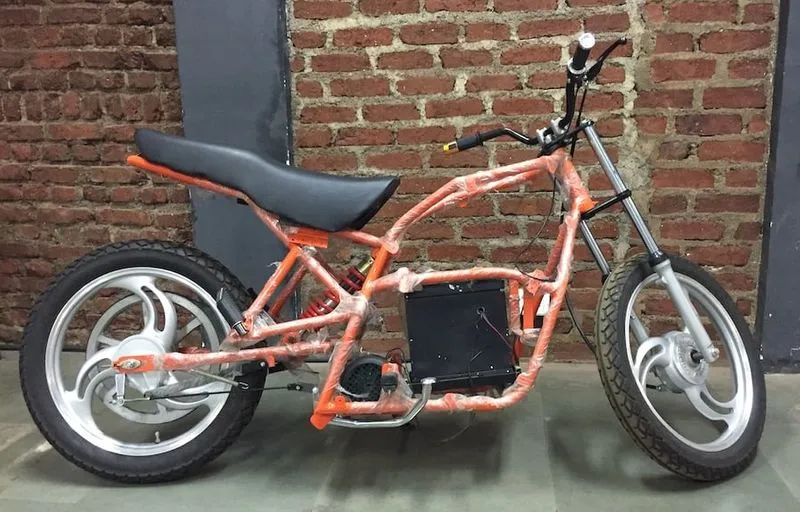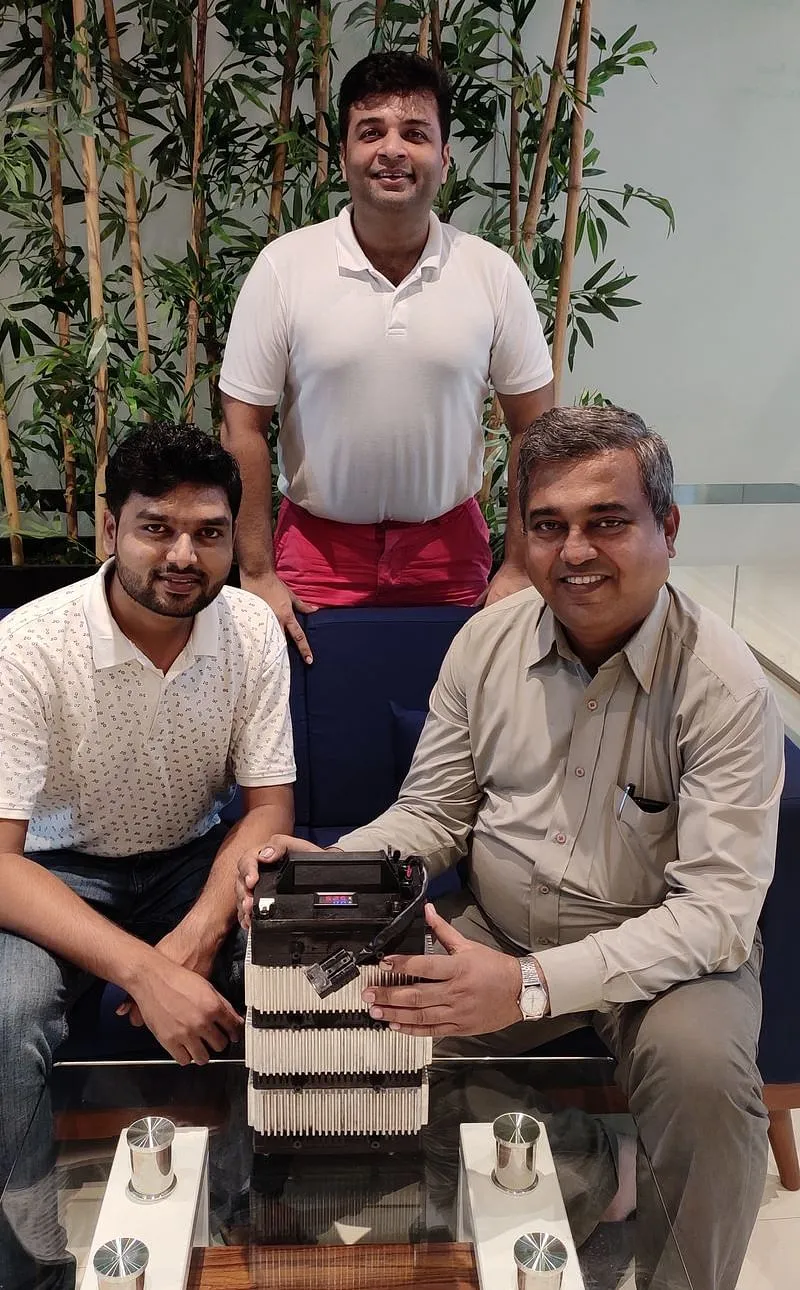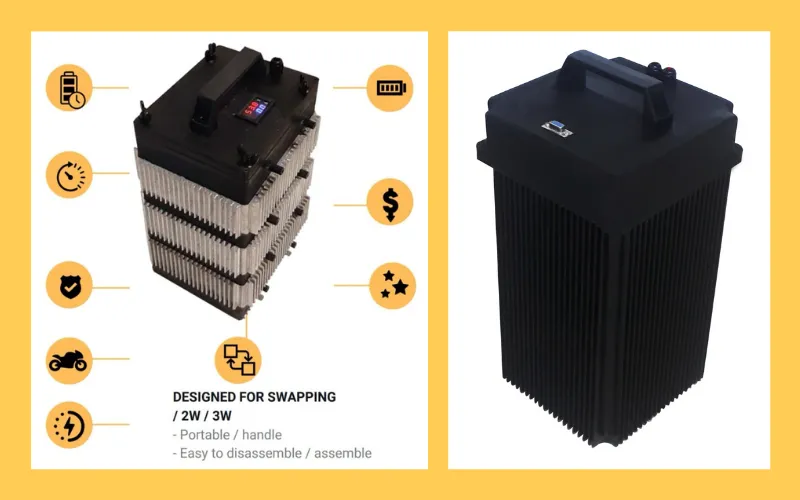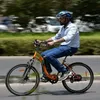[Tech30] Mumbai startup Zeuva Automotive's batteries can reduce cost and increase life cycles of EVs
Zeuva Automotive started making cost-effective batteries for EVs after a pivot in 2018. It finds a mention in YourStory’s Tech30 list for fixing cell degradation, charging, and other battery issues that slow down EV adoption.
Nishant Ranjan always wanted to “build something large”.
While growing up in Bokaro Steel City in the 90s, and later, pursuing engineering at IIT-Kharagpur in the 2000s, he set his eyes firmly on entrepreneurship.
Nishant says "business was in the blood" and he was heavily inspired by Elon Musk. But it took him a while to bring his two interests — technology and automotive — together and start something of his own.
After a brief stint as the CTO of MyGlamm (beauty startup), which allowed Nishant to shore up his finances, he founded Zeuva Automotive in 2016, with the mission of building and popularising electric motorcycles.

Zeuva's e-bike prototype before the pivot in 2018
Even though EVs were just about beginning to buzz globally, their presence in India was almost absent. Zeuva soon realised that a large part of the EV problem was around batteries.
Nishant tells YourStory,
“We looked at OEMs and saw that they didn't build the battery packs themselves. They either bought or licensed from external vendors. Even today, EV makers in India are not building their own tech. And that was the opportunity for us... to solve other people’s problems.”
The pivot to batteries
After a few initial hiccups, Zeuva pivoted in 2018 to become a producer of lithium ion batteries for EVs. The company was incorporated the same year.
The Mumbai-based startup also roped in two co-founders — Manoj Bhataria, who had prior experience in scaling electronics and hardware products, and Vivek Dawange, who had been a trainee engineer at a large corporate.
Nishant says,
“There is a huge gap between what academia thinks is required in Li-ion battery development and what the industry really wants. We pivoted to build the complex technology behind EVs.”
Zeuva is backed by the Sardar Patel Technology Business Incubator (SP-TBI), and is looking to raise a “couple of million dollars” by 2021.

Zeuva Automotive founding team (L to R): Vivek Dawange, Nishant Ranjan and Manoj Bhataria
The product and what it solves
Zeuva has built low-cost battery packs that help build 5X cheaper electric bikes, scooters, and rickshaws. The batteries are lighter, more optimal, affordable, accessible, and environment-friendly.
“The per-kilometre rate of an elective vehicle is determined by its battery pack. So, EV adoption by fleets is directly linked to that,” Nishant explains.
The startup claims its battery packs also deliver 50 percent more lifetime value, and are equipped with fast-charging capabilities.

Image Courtesy: Zeuva Automotive
The patent-pending product is fully ‘Made in India’ and is further enhanced with features like passive thermal management, low power mode, voltage, current and temperature-based controls, portability, Bluetooth, and GPS connectivity.
The co-founder elaborates,
“The battery pack makes up over half of the EV’s cost. Traditionally, automotive companies import their technology from partners in either Japan or America. But the median vehicle in those markets is a car. In India, the median vehicle is a two-wheeler. That needs innovation in wires, electronics, optimisation, and configuration.”
Business model and market opportunity
While selling battery packs will be Zeuva’s main business model, it also plans to offer customised battery management services to B2B customers.
The startup is still in the pilot and pre-revenue phase.
It is targeting “top-tier OEMs”, fleet bike operators, and industries like ecommerce, foodtech, and logistics that need to optimise their transportation costs. “Conversations with some players are on,” Nishant says.
Following the potential fund raise in 2021, Zeuva plans to scale up operations by setting up a manufacturing unit, creating tonnes of jobs, building a product inventory, and ramping up its team.

Zeuva is targeting sectors like ecommerce, foodtech, logistics to reduce transportation costs
"We want to be at the forefront of customer adoption of clean technologies in the automotive space. We are solving the hard problems, which allow faster adoption of battery technology and faster action on climate change," Nishant says.
However, some challenges remain still. First, people in India don’t want to pay for EVs because they are more expensive than normal two-wheelers.
And second, "the charging infrastructure is inadequate, and the go-to-market for a hardware product is almost 18 to 24 months, which is much longer than that for software", explains the co-founder.
Despite the roadblocks, the NITI Aayog’s Electric Vehicle Mission 2030 is giving startups in the space a boost. It projects a $300 billion domestic market opportunity for energy storage companies.
Zeuva is a drop in that ocean. It finds a mention in YourStory’s Tech30 list for attempting to fix degradation, range, monitoring, and charging issues in EV batteries, and setting the foundation for quicker EV adoption in India.
In the process, it will help build a cleaner and greener transportation alternative.
Edited by Teja Lele


![[Tech30] Mumbai startup Zeuva Automotive's batteries can reduce cost and increase life cycles of EVs](https://images.yourstory.com/cs/2/f02aced0d86311e98e0865c1f0fe59a2/electric-scooters-1596102716582.png?mode=crop&crop=faces&ar=2%3A1&format=auto&w=1920&q=75)

_(1)_(1)1552900741642.jpeg?fm=png&auto=format&h=100&w=100&crop=entropy&fit=crop)


